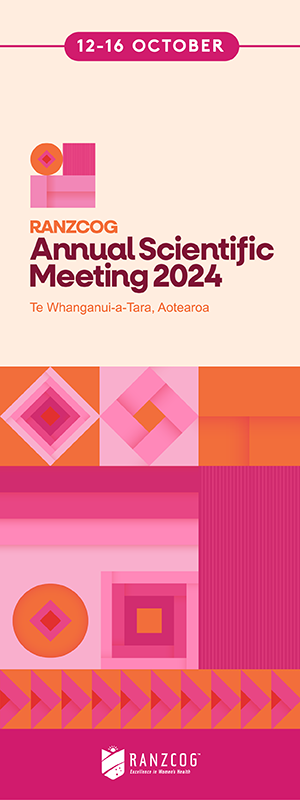This new O&G Magazine feature sees Dr Kirsten Connan in conversation with RANZCOG members in a broad range of leadership positions. We hope you find this an interesting and inspiring read. Join the conversation on Twitter #CelebratingLeadership @RANZCOG @connankf
Dr Fiona Brownfoot
MBBS, FRANZCOG, PhD
Dr Fiona Brownfoot is an O&G in public and private practice, a senior lecturer at the University of Melbourne, a PhD, a RANZCOG training supervisor and a clinical scientist. She is a mother, a runner, an avid traveller, a national and international speaker, and a strong advocate for scientific research as the foundation for clinical practice.
Dr Brownfoot’s interest in O&G was sparked through her interactions with Prof Gus Dekker and Prof Caroline Crowther in medical school at the University of Adelaide. Mentor relationships were formed and a passion for O&G and research was ignited.
During her residency, Dr Brownfoot witnessed the limited medical treatments often available for obstetric conditions. With this awareness, her interest in therapeutics for obstetric disease drew her to a laboratory-based PhD.
Dr Brownfoot was awarded her PhD in 2017, where she identified two potential treatments for preeclampsia, characterised these in laboratory studies and progressed them to clinical trial. Following her PhD, she was awarded a National Health and Medical Research Council (NHMRC) Early Career Fellowship (2018–2022) at the Mercy Hospital for Women, University of Melbourne. Dr Brownfoot is a Mercy Perinatal Research Fellow and is in the Translational Obstetrics Group led by Prof Stephen Tong at the University of Melbourne. She has more than 30 publications to her name in the last five years. Dr Brownfoot has earned six national and seven international awards for her work. She has been awarded A$350,000 in grants.

Dr Fiona Brownfoot
What’s new in your professional journey?
Through my PhD, I identified and explored the exciting possibility of two new medical treatments for preeclampsia. Using a pipeline of laboratory assays, I was able to show that metformin and sulfasalazine reversed key placental and cardiovascular features of preeclampsia. We have now taken both medications to clinical trial, exploring their effect in treating preeclampsia by way of a randomised controlled trial led by Dr Cathy Cluver in South Africa and a pharmacokinetics study at the Mercy Hospital for Women.
Following the completion of my PhD, I accepted a senior lecturer post at the University of Melbourne and I am now developing new research streams. It is extremely exciting to be able to use the laboratory as a playground to explore possible medical treatments to improve clinical outcomes.
A new research stream for me is medical device development and I am enjoying immersing myself in this. I am in the process of developing an obstetric biomedical engineering laboratory within the Translational Obstetric Group. It is exciting to collaborate and unite multidisciplinary fields for one common goal: to improve maternal and child health.
What have been the highlights of your career?
There is no greater exhilaration than the moment you realise you have discovered something the world has never seen before! Seeing the idea develop across laboratory assays and extend into clinical trial makes all of the hard work worthwhile.
As a result of my research focus, I have had the opportunity to attend many international conferences, meeting some of the most incredible minds in our field. I was selected to undertake a course at the Marine Biological Laboratory, the birthplace of reproductive medicine, in Woods Hole, Massachusetts in the US. I met many of the world’s most influential scientists in women’s healthcare.
Furthermore, I have had the opportunity to collaborate with inspiring and influential people in our field locally, including Prof Sue Walker, A/Prof Joanne Said and Dr Stefan Kane.
How did you decide what pathway to take for your O&G career?
I feel very lucky to work in the area I love, straddling my passion for both clinical practice and molecular science. This is the result of my mentors, including clinicians Prof Stephen Tong, Prof Sue Walker and Prof Michael Permezel and scientists Dr Tu’uhevaha Kaitu’u-Lino and Dr Natalie Hannan. I also chose this career path as a result of my patients and a desire to explore new treatments for their obstetric conditions.
What role has RANZCOG played in your career?
I am very grateful that the College supported my interest in research through the opportunity to complete a PhD during my training years (facilitated with working at reduced hours and supported time off the training program). The College further supported me through the Arthur Wilson Memorial Scholarship, contributing $60,000 towards my laboratory work.
What are the current challenges for RANZCOG?
I think the challenges for RANZCOG relating to research lie in the plethora of results coming out of the literature and keeping members informed as to best practice.
What have been the biggest challenges in your career and how have you overcome them?
Perhaps the biggest challenge has been finding balance between the research and clinical aspects of my career and my home life. For me, clinical work and research absolutely complement each other, and developing and translating concepts are dependant on having an in-depth understanding of both. However, independently, research and clinical work can be all-consuming, let alone when you are trying to combine both career paths. To overcome this, it is important to constantly re-evaluate your focus and set achievable goals. Surrounding yourself with like-minded people and mentors is invaluable.
Do you see yourself as a leader?
No, not really. I am simply privileged to be working in a relatively unique area, in a field I love.
Do you see yourself as a feminist?
Yes, I do. I am an advocate for women. It is extremely sad that there is an under-representation of women in leadership positions.
How do you prioritise family and professional life?
I find it extremely difficult. It is important to have a great network of people around you. It definitely takes a village to raise a child, especially when you are working in research and clinical settings.
What advice would you give to a new trainee?
Find the area you are passionate about and go for it. Align yourself with like-minded people and you can achieve whatever you put your mind to.
Have you seen workplace culture change during your career?
I am very fortunate to be part of the Mercy Hospital for Women family. Friendships at work really enhance the clinical and research environment. Working in a family-friendly environment with an option to working part-time has been key.
What three words best describe your life?
Enthusiastic, passionate and driven; all for women’s healthcare!
Are you willing to be contacted for career advice or mentoring?
I am very happy to speak with trainees about a career as a clinician scientist and discuss the possibility of embarking on a PhD.
Developing therapeutics for preeclampsia
Our field has been attempting to find a treatment for preeclampsia for centuries. From headdress to amulets in ancient times, and bloodletting and leeches in the medieval era, a medical solution still eludes us today. Recent advances in our understanding of the pathogenesis of preeclampsia have opened a new therapeutic era for this disorder of pregnancy. With the discovery that elevated placental anti-angiogenic molecules sFlt-1 and sENG cause preeclampsia, accompanied by a reduction in the angiogenic molecules placental growth factor (PlGF) and vascular endothelial growth factor (VEGF), we now have a molecular drug target.
Excitingly, we have now identified two well-known medications, metformin and sulfasalazine (both safe in pregnancy), that mitigate key features of preeclampsia. Using a pipeline of laboratory assays, we found that both metformin and sulfasalazine reduced placental secretion of sFlt-1 and sENG, and sulfasalazine upregulated PlGF and VEGF. Both medications also mitigated key markers of endothelial dysfunction and corrected vasodilation of whole omental vessels. It appears that both medications are, interestingly, exerting their effect by blocking the mitochondrial electron transport chain or epidermal growth factor pathways.
Metformin and sulfasalazine are both extremely promising candidate therapeutics for preeclampsia. We are now progressing this investigation to clinical trial to determine whether they can, in fact, prevent or treat this devastating disease.






Leave a Reply